Related Research Articles
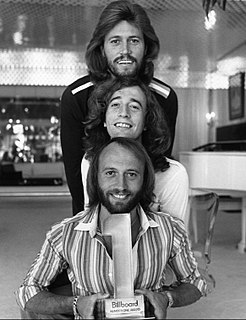
The Bee Gees were a music group formed in 1958. Their lineup consisted of brothers Barry, Robin, and Maurice Gibb. The trio were especially successful as a popular music act in the late 1960s and early 1970s, and later as prominent performers of the disco music era in the mid-to-late 1970s. The group sang recognisable three-part tight harmonies; Robin's clear vibrato lead vocals were a hallmark of their earlier hits, while Barry's R&B falsetto became their signature sound during the mid-to-late 1970s and 1980s. The Bee Gees wrote all of their own hits, as well as writing and producing several major hits for other artists. The Bee Gees are widely referred to by many critics, media outlets and fellow artists as the "Kings of Disco".
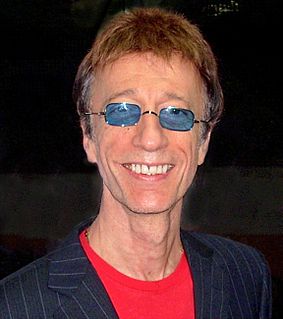
Robin Hugh Gibb was a British singer, songwriter and record producer, who gained worldwide fame as a member of the pop group the Bee Gees with older brother Barry and fraternal twin brother Maurice. Robin Gibb also had his own successful solo career. Their younger brother Andy was also a singer.

Maurice Ernest Gibb was a British musician, singer, songwriter and record producer who achieved fame as a member of the Bee Gees. Although his elder brother Barry Gibb and fraternal twin brother Robin Gibb were the group's main lead singers, most of their albums included at least one or two songs featuring Maurice's lead vocals, including "Lay It on Me", "Country Woman" and "On Time". The Bee Gees were one of the most successful rock-pop groups of all time.

Sir Barry Alan Crompton Gibb is a British-American musician, singer-songwriter and record producer who rose to worldwide fame as a co-founder of the group Bee Gees, one of the most commercially successful groups in the history of popular music. With his younger brothers, twins Robin and Maurice Gibb, he formed a songwriting partnership beginning in 1955.
Andrew Roy Gibb was an English singer and songwriter. He was the younger brother of the Bee Gees: Barry, Robin and Maurice Gibb.

Cucumber Castle is the seventh studio album by the Bee Gees, released in April 1970. It was produced by Barry Gibb, Maurice Gibb, and Robert Stigwood. It consists of songs from their television special of the same name, which was named after a song on their 1967 album Bee Gees' 1st. Cucumber Castle is the only Bee Gees album not to feature any recorded contributions from Robin Gibb, as he had left the group before the album was recorded.
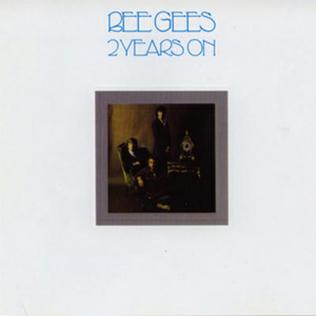
2 Years On is the eighth studio album released in 1970 by the Bee Gees, which reached No. 32 on the US charts, and sold 375,000 copies worldwide. The album saw the return of Robin Gibb to the group after an earlier disagreement and subsequent split following Odessa. 2 Years On was the first album with drummer Geoff Bridgford, who remained a full-time member of the group until 1972 although he was not pictured on the sleeve. The best-known track is "Lonely Days". Released as the first single by the reunited brothers, it charted high in the US, but peaked at No. 33 in the United Kingdom.

To Whom It May Concern is the tenth album by the Bee Gees. Released in October 1972, it was the follow-up, and continued the melancholic and personal sound of its predecessor Trafalgar. The album was recognized as "a farewell to the old Bee Gees" as the album marked the end of an era for the group in several ways: it was their last album to be recorded solely at IBC Studios, in London, their last with conductor and arranger Bill Shepherd who had guided them since 1967, and their last under their first contract with Robert Stigwood. Some of the songs were old ones finished up or rewritten for the occasion. To Whom It May Concern has sold approximately 350,000 copies worldwide.

"How Can You Mend a Broken Heart" is a song released by the Bee Gees in 1971. It was written by Barry and Robin Gibb and was the first single on the group's 1971 album Trafalgar. It was their first US No. 1 single and also reached No. 1 in Cashbox magazine for two weeks.

"First of May" is a song by the Bee Gees with lead vocals by Barry Gibb, released as a single from their 1969 double album Odessa. Its B-side was "Lamplight". It also featured as the B-side of "Melody Fair" when that song was released as a single in the Far East in 1971 as well as in 1976 and 1980 on RSO Records. It was the first Bee Gees single to be released after lead guitarist Vince Melouney had left the group.
"Alive" is a ballad recorded by the Bee Gees for their album To Whom It May Concern. It was the second and last single from the album released on 10 November 1972 worldwide. The song was credited to Barry and Maurice Gibb and produced by the Gibbs and their manager Robert Stigwood.
"On Time" is a song written by Maurice Gibb and recorded by the Bee Gees released on 14 January 1972 as the B-side of the single "My World".

"I'll Kiss Your Memory" is the first solo single written, performed and produced by Barry Gibb, released in May 1970. It peaked at number 16 in the Netherlands. The song was intended for Gibb's unreleased debut album The Kid's No Good.
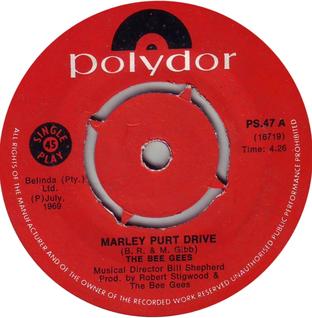
"Marley Purt Drive" is a song recorded by the Bee Gees, It was written by Barry, Robin & Maurice Gibb and released in March 1969 on the album Odessa. It was released in stereo in the United States in January and its mono version was released in the United Kingdom in March. The remastered version of this song was released on 27 February 2009 on Reprise Records.

The Kid's No Good was to have been the debut solo album by British musician Barry Gibb following his departure from the Bee Gees, in December 1969. There was no official title given to the album at the time. The line "the kid's no good", which the album is commonly titled on several bootleg releases, is also featured in the Bee Gees song "Come Home Johnny Bridie" on the 1973 album Life in a Tin Can. The album features orchestral arrangements by Bill Shepherd who performed the same role for the Bee Gees from 1965 to 1972.

"Morning of My Life" is a song written by Barry Gibb in 1965 whilst in the town of Wagga Wagga, Australia and later recorded by the Bee Gees and several other artists. It was recorded in 1966 during sessions for the album Spicks and Specks, and later was released as the opening track on the compilation Inception/Nostalgia in 1970. The first recording of the song to be released by any artist was by Ronnie Burns, first as a B-side to his Exit, Stage Right single in June 1967 and a month later on his Ronnie LP.
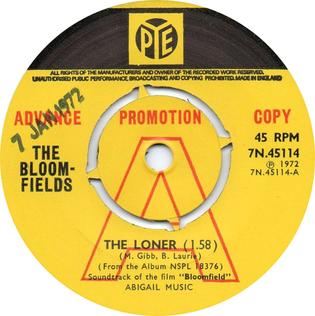
"The Loner" is a song written by Maurice Gibb and Billy Lawrie and originally included on Gibb's The Loner which was not released, although British rock band The Bloomfields covered the song and their version was released internationally, featuring a lead vocal of Billy Lawrie and Maurice Gibb, with Gibb on guitars and bass. They recorded this song for the film Bloomfield, but the film was called The Hero in America. The song starts with a drum fill. Gibb and Lawrie sang together in harmony on the line I'm a loner. On the record, Billy Lawrie was credited as 'B. Laurie'.
"One Bad Thing" is a song written by Barry Gibb in 1969, with Maurice Gibb Re-recorded by Gibb for his debut solo LP The Kid's No Good. The original copyright of the song was originally credited to Barry and Maurice, but the other versions credited only to Barry alone.
"King Kathy" is a song written, performed and produced by Barry Gibb. The song was included on Barry Gibb Fan Club. It was written in 1970 while he wrote other songs for his debut album The Kid's No Good. It was released in 1971 on Lyntone Records.
References
- ↑ Brennan, Joseph. "Gibb Songs: 1970" . Retrieved 9 April 2013.
- ↑ Brennan, Joseph. "Gibb Songs: 1971" . Retrieved 9 April 2013.
- ↑ Playboy Records April Foldout. Billboard. 29 April 1972. p. 43. Retrieved 20 January 2013.
- ↑ Brennan, Joseph. "Gibb Songs: 1972" . Retrieved 9 April 2013.